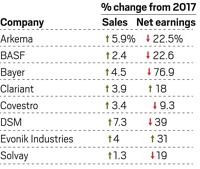Advertisement
Grab your lab coat. Let's get started
Welcome!
Welcome!
Create an account below to get 6 C&EN articles per month, receive newsletters and more - all free.
It seems this is your first time logging in online. Please enter the following information to continue.
As an ACS member you automatically get access to this site. All we need is few more details to create your reading experience.
Not you? Sign in with a different account.
Not you? Sign in with a different account.
ERROR 1
ERROR 1
ERROR 2
ERROR 2
ERROR 2
ERROR 2
ERROR 2
Password and Confirm password must match.
If you have an ACS member number, please enter it here so we can link this account to your membership. (optional)
ERROR 2
ACS values your privacy. By submitting your information, you are gaining access to C&EN and subscribing to our weekly newsletter. We use the information you provide to make your reading experience better, and we will never sell your data to third party members.
Business
Europe’s chemical industry confronts shrinkage
Asian growth, U.S. cost advantage lead to declining sales for third year in a row
by Michael McCoy
October 12, 2016
| A version of this story appeared in
Volume 94, Issue 41
Europe’s chemical industry is confronting the hard truth that it is shrinking—both in absolute terms and as a share of the global chemical market.
Cefic, Europe’s main trade association for chemical companies, released its latest economic report at its annual meeting, held in Florence, Italy, earlier this month, and the top-line figures are stark.
European Union chemical sales registered their third consecutive year of decline in 2015, falling more than 3% to about $575 billion. Even more startling, Europe’s share of global chemical sales shrunk to 14.7% in 2015 from 17.3% in 2014.
“What we’re seeing is what we’ve predicted for many years now,” said Marco Mensink, Cefic’s director general. “Asia’s fast-growing market, coupled with the U.S. shale boom, means Europe needs to act fast to stay competitive.”
Mensink pointed to fuel, feedstock, and energy costs as Europe’s Achilles’ heel. “Making ethylene costs twice in the EU than it does in the U.S., despite low oil prices,” he said.
At the meeting, Clariant CEO Hariolf Kottmann took over as Cefic’s president from Solvay CEO Jean Pierre Clamadieu. Kottmann told attendees that his priority will be enhancing the innovative role of Europe’s chemical industry to counter the rising competitiveness of other regions.
The good news, Mensink said, is that Europe is positioned to provide solutions to global challenges by, for example, offering energy-efficient materials that combat climate change. But he cautioned that European firms need to link up research, development, and commercialization at a faster rate.




Join the conversation
Contact the reporter
Submit a Letter to the Editor for publication
Engage with us on Twitter